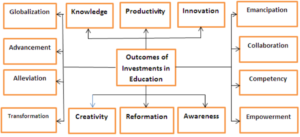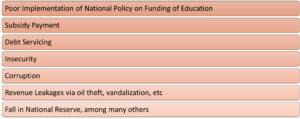Get competitive returns on your halal investment with Trust Arthur
Start Investingfinance@trustarthurgroup.com
finance@trustarthurgroup.com
Get competitive returns on your halal investment with Trust Arthur
Start Investing
Image Credit: The Brookings Institution
Education equips individuals with knowledge, skills, and competencies that are vital for economic productivity. A well-educated workforce is better positioned to access employment opportunities, increase productivity, and contribute to economic growth.
Education is a powerful tool for breaking the cycle of poverty, reducing income inequality, fostering creativity, critical thinking, and problem-solving skills, and enhancing social cohesion and equity. hence, the need for equitable access to quality education for all, regardless of their socioeconomic status, geographic location, or any other form of disadvantage.
Owing to Nigeria’s youthful demographic, accounting for about 54%, there is a tremendous strain on the education system, and a pressing need to restructure the educational system to promote (a more inclusive and sustainable) growth of not only the Nigerian economy but also her human capital.

Recognizing the need for investments in education as a tool for nation-building (as it can boost the human capital assets of individuals, reform the society and foster economic advancement for increased welfare), the United Nations Educational, Scientific and Cultural Organization (UNESCO) recommended a benchmark of 15-26% of the annual budget for education
However, Nigeria had their budgetary allocation to education below the UNESCO recommendation of 15% to 26% of GDP, with 5.14% allocated to
education in 2021; a positive annual change following 5 years of percentage decline as shown below.
| Year | Education Spending (% of GDP) | Annual Change |
| 2023 | 5.11% | -2.1% |
| 2022 | 7.21% | 2.07% |
| 2021 | 5.14% | 0.01% |
| 2020 | 5.13% | -0.72% |
| 2019 | 5.86% | -0.09% |
| 2018 | 5.94% | -0.18% |
| 2017 | 6.12% | -0.53% |
| 2016 | 6.65% | -2.60% |
| 2015 | 9.26% | 0.22% |
Barriers to Education Financing in Nigeria

Some funding issues and gaps are as follows; Dilapidated infrastructure, insufficient numbers of qualified teachers, resource shortages, and outdated curricula.
To close these funding gaps, a comprehensive approach is imperative! An approach that includes increasing the budget allocation for education, optimizing the utilization of funds, and diversifying funding sources.
The Three Pillars of Education Financing
2. Grants
3. Subsidy
The FRN national policy (2013) in section eight stated that “Education is a capital-intensive social service, which requires adequate financial provisions from all tiers of government for successful implementation of its programs. The government’s goal is to make education free at all levels in addition to assistance from International and Local Development Partners, grants for research, and other donor agencies. The financing of education is a joint responsibility of the Federal, State/FCT, Local Governments, and the private sector.
Hence, each entity needs to reassess its roles in educational financing.
Role of Government, Private Sector, and NGOs
Government
Private Sector
NGOs
Summary
Education is the cornerstone of inclusive growth. It equips individuals with the tools they need to participate in the workforce, escape poverty, and contribute to the economy. Furthermore, it promotes social cohesion, and gender equality, and reduces inequality. To achieve inclusive growth, it is imperative that we collectively invest in education, ensuring that it is accessible and of high quality for all. By doing so, we can build a more equitable, prosperous, and harmonious future for all members of society.
Contact
Phone: +2348177000140, +2348177000150
Email: info@trustarthurgroup.com
Office: 11, Oko-Awo Street, Victoria Island, Lagos.
Leave A Comment